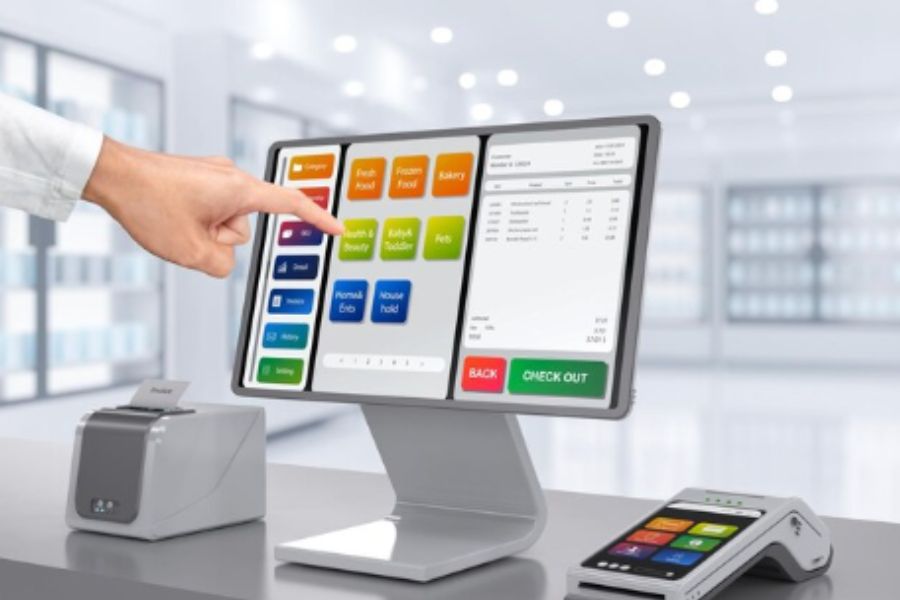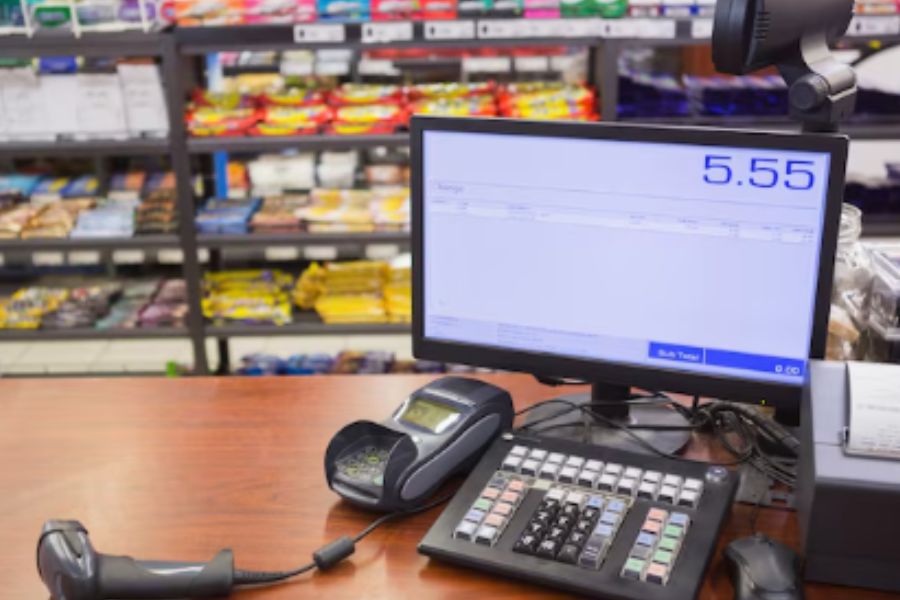Choosing the ideal jewelry store POS goes beyond mere transactional efficiency; it’s about crafting a customer-centric experience that resonates with the essence of fine jewelry. In this article, we explore the key considerations and features essential for selecting a POS solution tailored to meet the unique needs and expectations of both jewelers and their discerning clientele.
What Is A Jewelry Store POS?
The global jewelry market, valued at USD 353.26 billion in 2023, is anticipated to witness a compound annual growth rate (CAGR) of 4.7% from 2024 to 2030.

In the context of this thriving industry, a jewelry store POS (Point of Sale) system plays a pivotal role. This specialized POS is a comprehensive solution designed to streamline and enhance the retail operations of jewelry stores.
It goes beyond conventional transaction processing, offering features tailored to the unique needs of the jewelry business, such as managing repairs, custom configurations, and engravings. With the market poised for growth, a POS for jewelry stores becomes an essential tool for businesses looking to efficiently manage transactions, track inventory, and provide a customer-centric experience in this dynamic and expanding global jewelry market.
Key features of a jewelry store POS may include:
- Inventory Management: Efficient tracking and management of jewelry inventory, including different types of jewelry items, gemstones, and precious metals. This helps store owners keep accurate records of their stock levels, easily identify popular products, and monitor sales trends.
- Sales Processing: The POS system allows for seamless and secure transactions, enabling staff to process sales, generate receipts, and manage various payment methods, including cash, credit cards, and other forms of payment commonly used in the jewelry industry.
- Customer Relationship Management (CRM): A jewelry store POS often includes CRM features to maintain customer profiles, track purchase history, and manage loyalty programs. This helps store owners and staff provide personalized services and recommendations to customers.
- Integration With Other Systems: Seamless integration with other business tools such as accounting software, supplier databases, and e-commerce platforms, ensuring a cohesive and efficient operation.
- Employee Management: Tools for managing employee access, tracking sales performance, and monitoring staff productivity. This can include features like clocking in and out, commission tracking, and role-based access control.
- Appraisal And Certification Tracking: Some systems may include features for managing appraisals and certifications associated with jewelry items. This is particularly important for high-end jewelry where authenticity and quality documentation are crucial.
- Security: Robust security measures to protect sensitive customer information, financial transactions, and the overall integrity of the POS system. This includes encryption, user authentication, and regular software updates to address potential vulnerabilities.
- Reporting And Analytics: Comprehensive reporting tools that allow store owners to analyze sales data, track inventory turnover, and gain insights into business performance. This data-driven approach helps in making informed decisions and optimizing business strategies.
In summary, a jewelry store POS is a sophisticated tool designed to enhance the overall efficiency and management of retail operations within the jewelry industry. It goes beyond traditional point-of-sale systems to meet the specific needs and challenges faced by jewelry retailers.
How A Jewelry Store POS Can Help You Increase Sales
Owning a jewelry store necessitates vigilant inventory management, and a POS system proves invaluable in this regard by monitoring product sales trends. This data is crucial for informed decision-making regarding inventory restocking and pricing strategies.
Furthermore, POS systems contribute to increased sales through the implementation of customer loyalty programs and gift cards. These initiatives foster customer retention and encourage repeat purchases, ultimately boosting revenue.
Beyond sales tracking, jewelry store POS assists in setting and monitoring sales goals, allowing for a better understanding of target customer demographics and identifying avenues for business growth.
Effective management of customer orders and employee sales is another advantage of a POS system. This system enables a meticulous assessment of product performance, facilitating decisions on which items are thriving and which may require adjustments. Additionally, POS systems offer financial management tools, tracking expenses and providing insightful reports to enhance overall financial oversight.
Moreover, POS systems enhance customer service by incorporating features such as built-in loyalty programs, enabling the rewarding of loyal customers for continued patronage.
By offering a real-time overview of on-hand inventory, a POS system aids in timely stock reordering when necessary. It provides a comprehensive view of sales data, allowing for adjustments in stock levels to align with the demand for specific products.
Overall, a well-implemented POS system is not just a sales processing tool but a multifaceted solution that empowers jewelry store owners to make informed decisions, foster customer loyalty, and optimize various aspects of their business operations.
How To Choose The Best Jewelry Store POS?
In the realm of retail excellence, a sophisticated jewelry store POS stands as the linchpin for jewelry businesses seeking operational efficiency and superior customer service. As we delve into the essential features that define an ideal POS solution, we emphasize a seamless and comprehensive approach to handling diverse customer requests, from intricate repairs to personalized engravings.
Requests For Repairs, Configurations, And Engravings
A robust POS system should seamlessly manage a spectrum of customer requests, including repairs, custom configurations, and engravings. It is imperative to prioritize a solution that offers a streamlined process for tracking and overseeing these specialized orders, ensuring efficient and customer-centric service.
Tailored Labeling
An essential feature for jewelry businesses is the ability to create customized labels for each item. The chosen jewelry store POS should empower users to tailor labels with precision, incorporating relevant details such as product specifications, pricing, and barcodes. This ensures a professional and tailored presentation of each jewelry piece.
Unique Orders, Advance Payments, And Reservations
Opting for a POS system that effectively manages unique orders, facilitates advance payments, and handles reservations is crucial. Systems like ConnectPOS have garnered recognition for their proficiency in managing special orders and providing a flexible and customer-friendly experience.
Items Without Barcodes
In the dynamic world of jewelry retail, it’s common to encounter items without pre-assigned barcodes. Therefore, the selected POS system should allow for the easy manual entry of product details, ensuring that items without barcodes can be seamlessly added to the inventory without disrupting the workflow.
Asset Monitoring For Insurance
Enhancing security measures and facilitating insurance purposes should be a priority for a POS system. Look for a solution that includes asset monitoring features, allowing for the meticulous tracking of the movement and status of high-value items. This data becomes invaluable in the case of insurance claims, providing a comprehensive overview of the inventory.
Data Integrations
An excellent jewelry store POS should encompass all the necessary features to effortlessly export data, sales records, and other information, allowing seamless integration with various retail information systems.
For instance, you might need to transfer sales data to your accounting software during year-end tax preparations or migrate customer information to your CRM for targeted marketing promotions. The presence of simplified data integrations streamlines the process of moving crucial information, enhancing operational efficiency.
When selecting a POS system, prioritize those that offer REST API integrations or feature data portability. This remains true even for individuals who may not possess extensive technical expertise, as it ensures a user-friendly experience and facilitates smooth data management in the long run.
Data Syncing Capabilities
Maintaining consistency across multiple locations and online platforms is a challenge that a dependable POS system should address. Systems like ConnectPOS excel in real-time synchronization of inventory, sales, and customer data, ensuring that the information remains accurate and up-to-date across all business channels.
Linking, Expansions, And Enhancements
Adaptability is key in a rapidly evolving business landscape. The chosen POS system should facilitate easy linking to other business tools, support expansions to accommodate business growth, and offer regular enhancements through updates. ConnectPOS has earned accolades for its adaptability to various business ecosystems and commitment to continuous improvement.
Commission Structures For Sales
Motivating and rewarding sales staff is a cornerstone of a successful retail operation. Therefore, a POS system that provides flexible commission structures based on sales performance is highly desirable. This feature not only boosts employee morale but also aligns incentives with business goals, fostering a dynamic and motivated sales team.
In summary, when choosing the best POS for your jewelry store, prioritize features that cater to your unique requirements, including customization, order management, asset monitoring, data syncing, and flexibility for future growth. ConnectPOS stands out as a solution that addresses many of these considerations, providing a comprehensive and tailored POS experience for jewelry retailers.
How Much Does A Jewelry Store POS Cost?
The cost of a jewelry store Point of Sale (POS) system can vary widely based on several factors, including the features and capabilities offered, the size of the jewelry store, and the specific needs of the business. Several factors should be taken into account as they can impact the overall cost:
- Basic Features vs. Advanced Capabilities: The cost of a POS system often correlates with the range of features it offers. Basic systems with standard functionalities such as inventory management, sales processing, and basic reporting may be more affordable. On the other hand, POS systems with advanced capabilities, such as specialized order management, detailed reporting, and integration with other business tools, may come at a higher cost.
- Hardware Requirements: The choice of hardware components, such as terminals, barcode scanners, receipt printers, and customer displays, can impact the overall cost. High-quality and technologically advanced hardware may contribute to a higher upfront investment.
- Cloud-Based vs. On-Premise Solutions: The deployment model also plays a role in determining costs. Cloud-based POS systems typically involve subscription-based pricing with monthly fees, while on-premise solutions might require a larger upfront investment for software licenses and hardware.
- Scalability: The size and scalability of the jewelry store POS can influence its cost. A system designed to accommodate the growth of a jewelry store, with support for multiple locations and a high volume of transactions, may come at a higher cost than a system designed for smaller-scale operations.
- Customization And Integration: If a jewelry store requires customization to meet specific business needs or integration with other software (e.g., accounting software, e-commerce platforms), this can add to the overall cost.
- Training And Support: Consideration should be given to the cost of training staff and ongoing support provided by the POS system provider. Some providers may include training and support in their packages, while others may charge separately for these services.
- Licensing Fees: Some POS systems may involve licensing fees for using the software. It’s essential to understand the pricing structure, whether it’s a one-time payment, subscription-based, or a combination of both.
To get an accurate estimate, it’s recommended to contact POS system providers directly, discuss the specific requirements of the jewelry store, and request a detailed quote tailored to the business needs. Additionally, consider any potential hidden costs, such as maintenance fees, updates, and additional user licenses, to ensure a comprehensive understanding of the total cost of ownership. For example, ConnectPOS offers a flexible pricing plan based on the number of devices and features, as well as a 14-day free trial for new customers.
FAQs About Jewelry Store POS
What Is The Difference Between A Jewelry Store POS And Jewelry Store Management Software?
While both jewelry store management software and POS (Point of Sale) serve the retail needs of jewelry stores, they have distinct purposes.
Jewelry store POS:
- Focus: Primarily designed for sales transactions and customer interactions at the point of sale.
- Key Features: Sales processing, inventory management, payment processing, and customer engagement tools.
- Purpose: Streamlines the in-store sales process, manages transactions, and tracks inventory in real time.
Jewelry store management software:
- Focus: Encompasses a broader range of business operations beyond the point of sale.
- Key Features: Inventory management, customer relationship management (POS CRM), supplier management, reporting, and analytics.
- Purpose: Provides a comprehensive solution for overall business management, including inventory tracking, order management, and strategic decision-making.
What Do You Need For A Jewelry Store POS System?
To establish a POS system, essential components include dedicated hardware like a Point of Sale terminal with peripherals such as barcode scanners, receipt printers, cash drawers, and credit card terminals. A stable network infrastructure, including reliable internet connectivity and local network setup, is crucial for seamless data syncing.
On the software side, specialized POS software is needed, optionally integrated with accounting and CRM POS solutions for a comprehensive system. Security measures, such as encrypted payment processing and user authentication, ensure data protection. Staff training is essential to familiarize employees with the POS system.
How Can A POS System Help Manage Your Jewelry Store?
A jewelry store POS system provides numerous benefits for efficient business management:
- Inventory Management: Tracks and manages jewelry inventory in real-time, allowing for accurate stock levels and preventing overstock or stockouts.
- Sales Processing: Facilitates smooth and secure transactions, supporting various payment methods including cash, credit cards, and electronic payments.
- Customer Relationship Management (CRM): Maintains customer profiles, purchase history, and loyalty programs, enabling personalized customer interactions and targeted marketing.
- Order and Repair Tracking: Manages special orders, advance payments, and repairs, providing a streamlined process for unique customer requests.
- Data Analytics: Generates comprehensive reports and analytics to help owners make informed decisions, identify sales trends, and set sales goals.
- Security And Compliance: Ensures the security of customer data and financial transactions, helping the business comply with data protection regulations.
- Efficient Employee Management: Monitors employee sales performance, tracks commissions, and manages staff roles and access.
- Integrated Solutions: Integrates with other business tools such as accounting software, supplier databases, and e-commerce platforms for a cohesive business operation.
A jewelry POS serves as a comprehensive tool for managing various aspects of your business, from sales and inventory to customer relationships and data analysis. It streamlines operations, enhances customer service, and provides valuable insights for strategic decision-making.
Conclusion
Selecting the perfect jewelry store POS requires a delicate balance of functionality, flexibility, and a deep understanding of the intricacies of the industry. By prioritizing a customer-centric approach and focusing on features that enhance the overall shopping experience, jewelers can elevate their business operations and build lasting connections with their customers in the ever-evolving world of fine jewelry retail.
If you seek additional information on this topic, we invite you to reach out to us directly.



